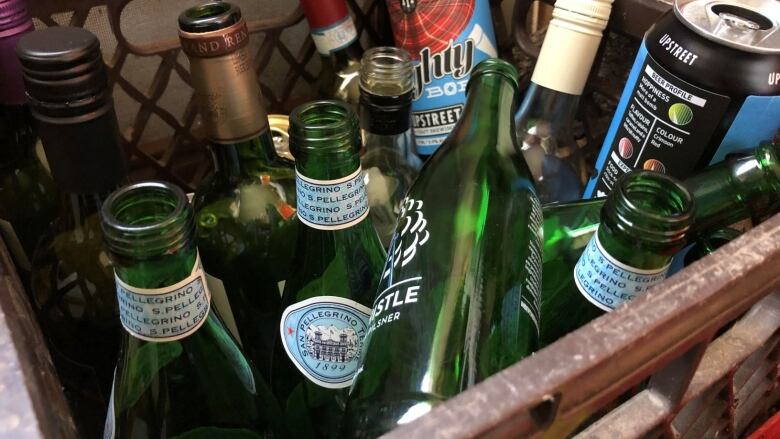Quebec delays expanded deposit system for bottles, cans but still plans to reform recycling industry
Government plans to make producers more accountable for recovering, recycling

A day after Quebec's environmental watchdogreprimanded the province for not meeting its waste reduction targets, Quebec announced it is postponing its expanded deposit-return system for drink containers, intended in part to manage its overflowing landfills.
The new policy, now scheduled for spring 2023, was scheduled for the end of 2022, but labour shortages caused by the pandemic prompted officials to offer retailers and several organizations involved an extra six months to prepare.
At a news conference Wednesday, Environment Minister Benoit Charette said the delay is "a very small price to pay to make sure we do things right."
In January 2020, the Quebec government announced all beverage containers from 100 millilitres to two litres in size will be returnable under a new deposit system.
All metal, plastic or glass containers will be eligible for the deposit, and multi-layered containers will be subject to the deposit two years after the system is implemented.
The government will require merchants who sell these products to take them back and refund the deposit. Wine and spirit bottles willbe worth25 cents, while other bottles will be worth 10 cents.
Charette said the expanded system will require the development of a large returns network, which will need1,500 points of service to serve at least 90 per cent of the population as soon as it isimplemented in 2023.
Develop homegrown facilities
The Environment Ministry estimates the newdeposit-return system will redirect50,500 tonnesof materialfrom landfill each year as of 2030and will reduce greenhouse gas emissions by the equivalent of about 26,500 tonnes of carbon dioxide.
In 2019, Quebec set a goal of reducing the amount of landfill waste per person to 525 kilograms or less by 2023. The most recent data shows that in 2019, that number was724 kg.
TheBureau d'audiences publiques sur l'environnement's (BAPE)reportsays nine of Quebec's 38 landfills will reach capacity by 2030 and 13 others will between 2030 and 2041 if the dumpingof waste continues at the 2019 rate.
According toAmlie Ct, a source reduction analyst for the environment groupquiterre, the value of the deposit system is not enough to encourage people to use it.
She says themoney collected should primarily be used to financereducing waste at sourceand making more containers reusable which the BAPE considers tobe the weakest links in the management of wastematerials in Quebec.
Karel Mnard, executive director of the Quebec Coalition of Ecological Waste Management, says he welcomes the deposit-system plan, but saysit's still a work in progress.

"We've been working on this issue for more than 25 years now," said Mnard. "I'll be fully satisfied when I'll be able to put my wine bottle in a reverse vending machine and have my deposit back."
Still, Mnard saysit's not enough to collect empties Quebec hasto recycle what itcollects and not waste money shipping the contents abroad.He says the province needs more recycling facilities to do that.
"It's a good thing to collect the bottles...but it's not enough. Wehave to recycle them as close as we can, so develop facilities here."
More accountability for producers
The new regulations announced Wednesday also aim to make producers and companies that put certainproducts on the market responsible for their long-term management.
A reform to Quebec'srecycling system willrequire companies that produce certain containers to develop, implement and financially supporta deposit systemin order to recover and recycle them.
As of 2027, a producer of cardboard packaging will have to reach a recuperation rate of 85 per cent, and the rate will be 80 per cent for producers of containers made of fibresand rigid plastics.
Charettesays he wants to put more pressure on producers of some other types of containers and packaging, to require them to use packaging that is easier to sort and less polluting.
"This will be one more way to reduce resource waste, promote the circular economy and reduce greenhouse gas emissions," he said.
With files from Kwabena Oduro, La Presse canadienne and Radio-Canada













_(720p).jpg)


 OFFICIAL HD MUSIC VIDEO.jpg)
.jpg)



























































































